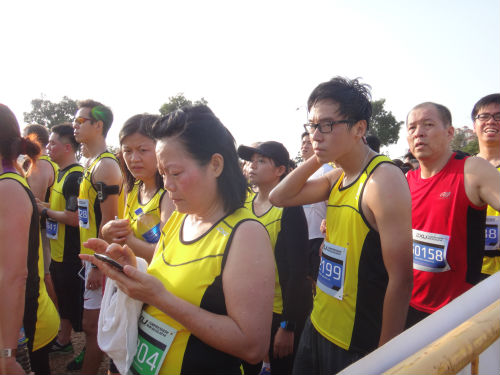During the weekend at the 2XU Compression Run marathon, a 45-year-old male runner, Martynn Koh Tong Yong, collapsed at the 11km mark of the race, while taking part in the Full Marathon. Other runners and medics came to his aid by trying to perform CPR on him and attempting to re-start his heart.
But Koh, who was later taken by ambulance 20 minutes later to the Tan Tock Seng hospital, was subsequently pronounced dead.
It is extremely unfortunate that some people are collapsing during marathons and endurance sports events. But why do these types of things happen, when participating in sports is supposed to be a healthy activity and is being constantly encouraged and promoted? Let’s take a look at a few of the possible reasons.
Heatstroke
A common reason for someone to collapse during a race is when the runner is exposed to a hot environment while doing strenuous, physical activities and becoming dehydrated too.
Heatstroke happens when the body temperature mechanism can no longer control the body’s own temperature. Those with uncontrolled diabetes, the obese and elderly runners are more prone to heatstroke. In serious cases, this can be fatal.
As a runner, you will know when something is wrong. If you are feeling symptoms such as nausea and vomiting, dizziness, fainting, disorientation and rapid, shallow breathing, you should stop and rest immediately. Drinking some water and resting in a cool, shaded place, would also help.
The person pushes too hard to make a new personal best timing
Runners are often egged on when they are approaching the finish line – to push with all their might so they can improve their finishing time by a few extra seconds. This may also contribute to some people pushing themselves harder than their bodies are capable of doing.
It is important to know your limits. There is no point in gunning for a new personal best by over-exerting your body in the final few hundred metres of an endurance race – only to collapse mere metres from the finish line.
So when you are taking part in endurance races, such as marathons, it is very important to know what your limits are. Do not push yourself too hard if you feel that you are not able to cope with it anymore.
Sometimes, it may be better to get to the finishing line in a sightly slower time, and be still alive and kicking – rather than collapsing, in a feeble attempt to reach a new personal best timing.
Having Low Sodium Levels in the blood
In some races, there may be plenty of hydration and water points available. Because of this, runners may be tempted to stop at every single hydration point and consume water – simply because it is available.
But drinking too much water causes the sodium levels in the blood to fall to a low level because fluids are diluting the blood. This condition is known as hypernatremia.
To prevent hypernatremia from occurring, try and drink just enough. You may know that you have drunk too much if you are feeling particularly bloated or if you can hear water sloshing around your tummy – as you are running. You should then stop drinking immediately and try to pass out some of the water – to stabilize the amount of sodium in your body
Running when you are sick
While it is usually not an issue to keep running if you have generic cold-like symptoms (such as a sore throat, sniffy nose and/or cough), you should practise caution if you have a fever or more serious symptoms.
This is because during a fever, the body system is already overheated. So engaging in strenuous activities may only make the fever worse because exercising will heat up the body even more. As a result, other more serious health complications and body infections may develop.
Many runners continue to train and take part in races when they are sick – and this may also be why their bodies may get overheated and so they collapse.
So the most important thing is to listen to your body and the message that it is giving to you. If your body is telling you that something is wrong, do not push yourself beyond your limits. Take a break and slow down instead.
Click here to read my experiences at the 2XU Compression Run.
Click here to read an interview with Singapore’s top marathoner, Mok Ying Ren, at 2XU Compression Run.
Click here for an interview with a Kenyan and the winner of the 2XU Compression Run (42km Category).


Leave a Comment